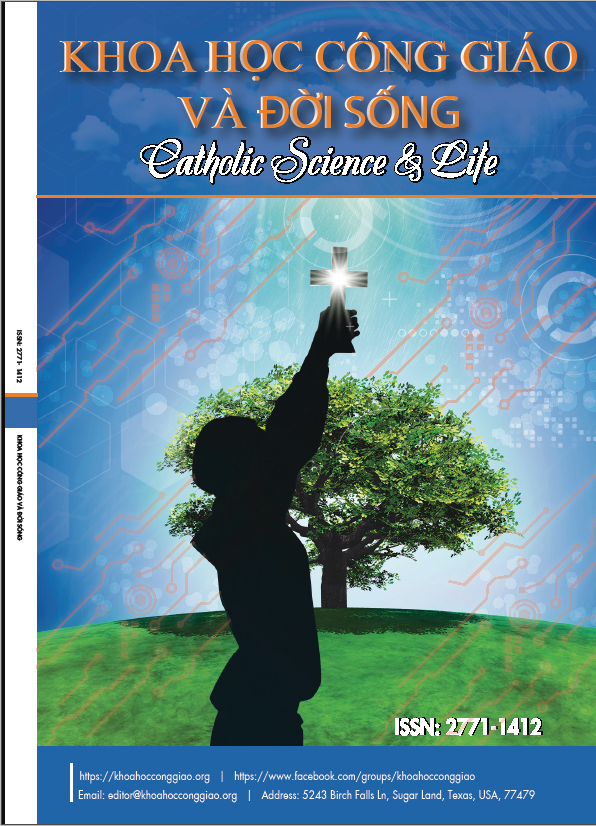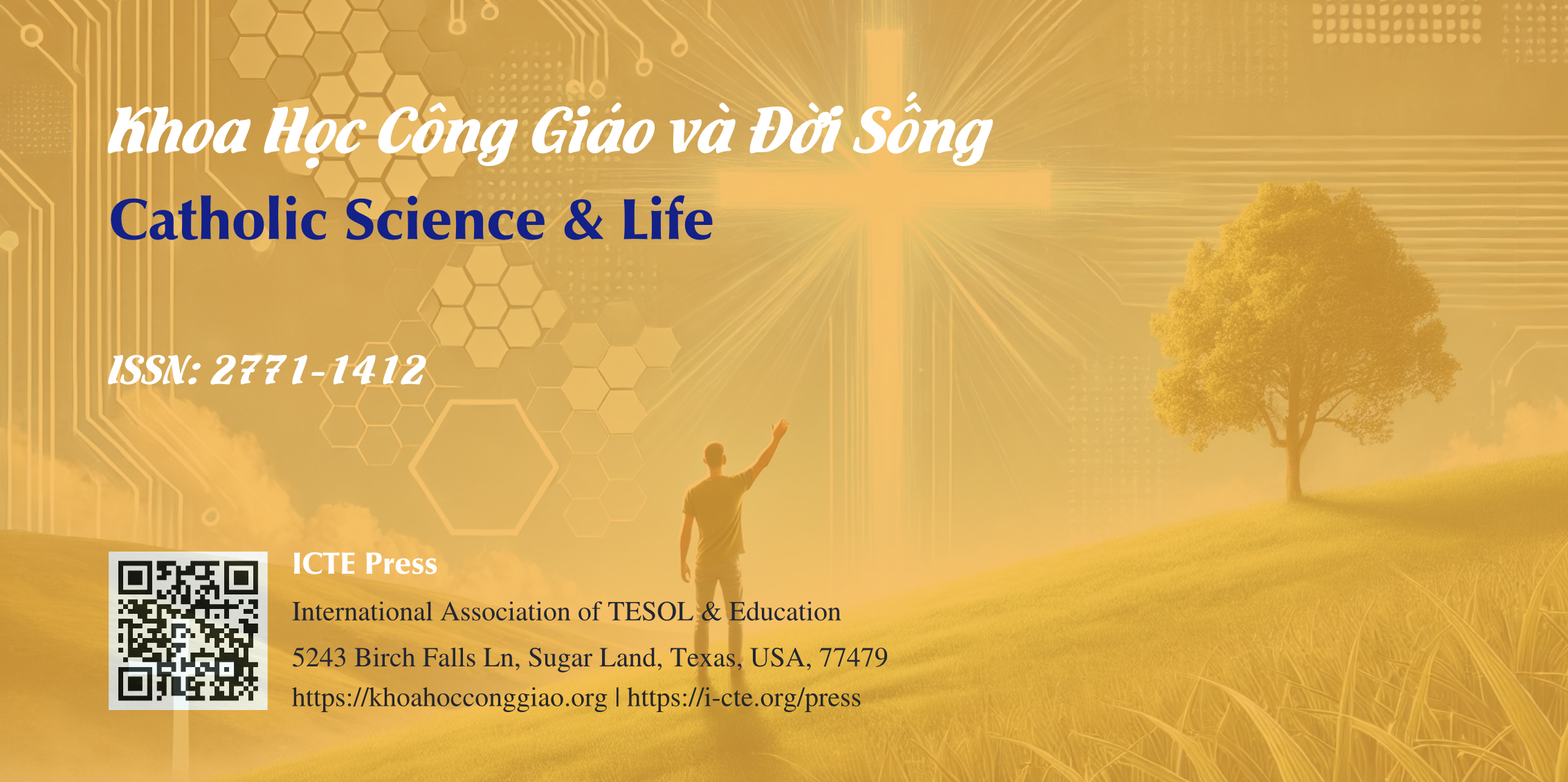Thái Độ Phê Phán Trong Sách Amos
Một Chiều Kích Cần Thiết Trong Ơn Gọi Ngôn Sứ
DOI:
https://doi.org/10.54855/csl.22226Từ khóa:
tính ngôn sứ, phê phán, Thiên Chúa, bất công xã hội, khủng hoảng, công bìnhTóm tắt
Khi đọc sách Amos, ta dễ dàng nhận ra một nét nổi bật trong nội dung của quyển sách, đó là những lời chỉ trích và phê phán. Dường như, Amos đã có một thái độ rất bất mãn với con người và xã hội thời bấy giờ. Điều này gợi lên cho người đọc những câu hỏi: Điều gì đã khiến ngôn sứ có thái độ bất mãn như thế? Thái độ đối nghịch này có ý nghĩa gì? Tại sao chúng ta tin rằng những lời chứa đầy thái độ bất mãn kia mang tính ngôn sứ? Phải chăng thái độ phê phán là một trong những chiều kích phải có của ơn gọi ngôn sứ?
Bài viết này sẽ đào sâu và trình bày thái độ phê phán chính là một chiều kích phải có của ơn gọi ngôn sứ. Chiều kích ấy rất cần thiết cho xã hội hôm nay. Theo đó, chủ đề này sẽ được triển khai thành 3 phần: (1) lối suy nghĩ của con người thời nay về thái độ phê phán; (2) tái khám phá thái độ phê phán của ngôn sứ qua chân dung Amos; (3) nét tương phản giữa thái độ phê phán của ngôn sứ với những lối suy nghĩ bàng quan, dửng dưng của Ki-tô hữu hiện đại. Phần cuối là những gợi hứng giúp người đọc phản tỉnh, tìm ra các lối suy nghĩ khác biệt, đa dạng và phong phú. Qua đó, ta có thể mở ra các chân trời mới để suy tư và hành động.
A Critical Attitude in the Book of Amos - An Essential Dimension in the Prophetic Vocation
When reading Amos, it's simple to notice a recurring theme in the book's content: criticism and criticism. Amos seemed to have had an extremely cynical view regarding people and society at the time. This begs the reader's question: What prompted the prophet's discontent? What does this diametrically opposed mindset imply? How can we know these dissatisfied remarks are prophetic? Is a critical attitude a necessary component of a prophetic vocation?
The purpose of this essay is to explore and illustrate the critical attitude that is a necessary component of the prophetic vocation. This component is critical in today's society. As such, this topic will be divided into three sections: (1) how people think about critical attitudes today; (2) rediscovering the prophet's critical attitude through the portrait of Amos; and (3) a comparison between the prophet's critical attitude and the indifferent, indifferent ways of thinking of modern Christians. The last section is intended to stimulate readers to contemplate and discover new, diverse, and interesting ways of thinking. Thus, we can expand our frontiers of thought and action.
Keywords: prophetic, critical, Divine, social injustice, crisis, justice
Tài liệu tham khảo
Bernhard W.Anderson (1998). Understanding the Old Testament. New Jersey: Prentice-Hall, 256 -257.
Cao Gia An (2018). Dấn Thân Xã Hội, Chiều Kích Đặc Trưng Của Ơn Gọi Ngôn Sứ, trong Hợp Tuyển Thần Học số 52. Biên Hoà: Nxb: Đồng Nai, 109.
Đào Duy Anh (1998). Việt Nam Văn Hoá Sử Cương. Đồng Tháp: Nxb: Đồng Tháp, 270- 305.
Israel Finkelstein and Neil Asher Silberman (2001). The Bible Unearthed: Archaeology’s New Vision of Ancient Israel and the Origins of its Sacred Texts. New York: Touchstone, 207.
Jeff Niehaus (1992). Amos, in the Minor Prophets: A Commentary on Hosea, Joel, Amos, edited by Thomas Edward McComiskey. Michigan: Baker Book House, 15.
Jeff Niehaus (1992). Amos, in the Minor Prophets: A Commentary on Hosea, Joel, Amos, edited by Thomas Edward McComiskey. Michigan: Baker Book House, 318.
John Barton (2012). The Theology of the Book of Amos. Cambridge: Cambridge University Press, 316-317.
Judith Butler (2002). What is Critique? An Essay on Foucault’s Virtue, in The Political: Readings in Continental Philosophy, edited by David Ingram. London: Basil Blackwell, 212-219.
Karl Rahner (1983). The Love of Jesus and the Love of Neigbor, translated by Robert Barr. New York: Crossroad, 16-18.
Michel Foucault (1972). The Archaeology of Knowledge & The Discourse on Language, translated by A.M.Sheridan Smith. New York: Pantheon Books, 80.
Michel Foucault (2007). What is Critique? in The Politics of Truth, edited by Sylvere Lotringer, translated by Lysa Hochroth & Porter. Los Angeles: Semiotext, 42.
Michel Foucault (n.d.). What is Critique?, 43 -47.
Michel Foucault (1997). Discipline and Punish: The Birth of the Prision, translated by Alan Sheridan. New York: Pantheon, 141-152.
Nguyễn Ngọc Rao (N.D.) Lịch sử dân Thiên Chúa trong Cựu Ước. Sài Gòn: Học Viện Đa Minh, 302-318, lưu hành nội bộ.
Phương Lựu (2012). Lí Thuyết Văn Học Hậu Hiện Đại. Hà Nội: Nxb Đại Học Sư Phạm, 13.
Shalom Paul (1991). Amos: A Commentary on the Book of Amos (Hermeneia). Minneapolis: Fortress Press, 1.
Vann D Rolfson (2002). The Syro-Ephraimite War: Context, Conflict, and Consequences, Studia Antiqua 2, no. 1, 87-92, https://scholarsarchive.byu.edu/studiaantiqua/vol2/iss1/11.
Viện Ngôn Ngữ Học (n.d.). Từ Điển Tiếng Việt Phổ Thông. TPHCM: Nxb. Tp Hồ Chí Minh 707.
Tải xuống
Đã Xuất bản
Số
Chuyên mục
Giấy phép
Bản quyền (c) 2022 Phaolô Đỗ Anh Tuấn, C.P.

Tác phẩm này được cấp phép theo Giấy phép quốc tế Creative Commons Attribution-NonCommercial 4.0 .
Authors retain copyright and grant the journal the right of first publication with the work simultaneously licensed under a Creative Commons Attribution 4.0 International License that allows others to share the work with an acknowledgment of the work's authorship and initial publication in this journal.
Authors are able to enter into separate, additional contractual arrangements for the non-exclusive distribution of the journal's published version of the work (e.g., post it to an institutional repository, in a journal or publish it in a book), with an acknowledgment of its initial publication in this journal.













